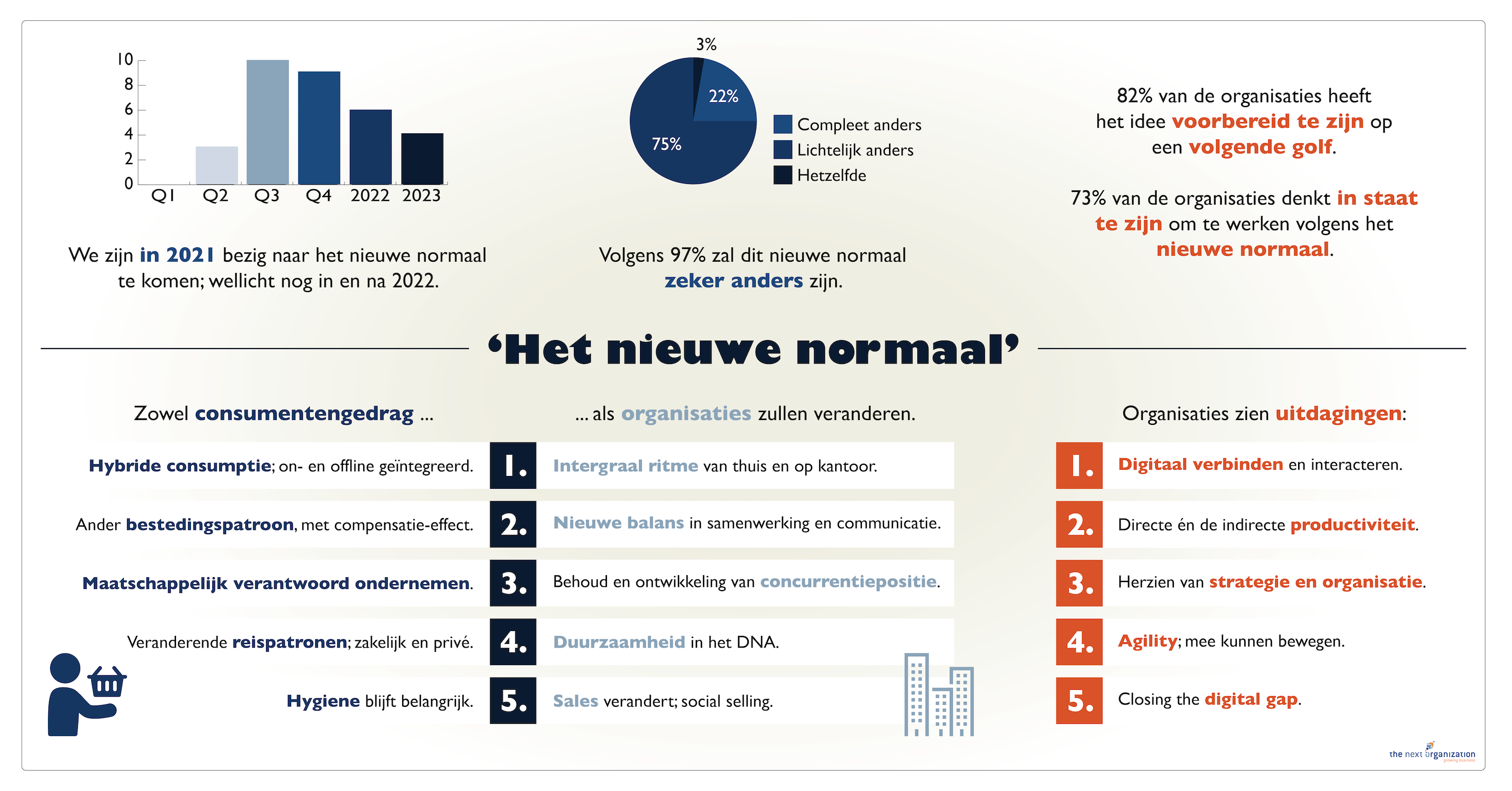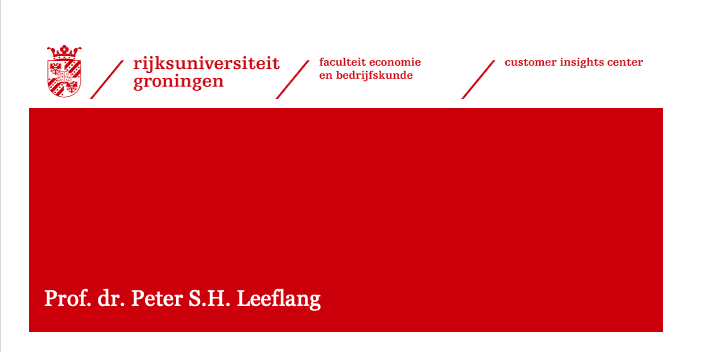Do people expect the new normal to look the same, slightly different or completely different? When we expect change, what does it mean for organisations, our society, consumer behaviour and are the organisations prepared for this? Questions that we can keep asking in our heads, but of which the answer lies in the future. Nevertheless, we wanted to give it a try and asked 40+ top-level management how they view these subjects.

The new normal will certainly be different.
We live in a rapidly changing world, although fully vaccinated populations are in the offing, this does not mean that the world is going back to exactly how it was. Results show that 97% of the participants expect 'the new normal' to be slightly to structurally different from the pre-corona situation. The expectation of the change in consumer behaviour can be divided into five subjects.
Moving towards a hybrid consumer society
We are on the way to a hybrid economy where off- and online merge seamlessly. Currently, everything goes online. As a result, we experience the efficiency of digital product orders, service provision and a reduction in travel time. At the same time, we experience the lack and the added value of physical contact with each other. Because of this, consumers will increasingly look for new experiences where the perfect balance between off- and online takes place. Like the movement of the growing interest in local, small and independent businesses for a unique offer and personal service. Despite the demand for physical meetings, we will notice that people will communicate more at a distance and will look for each other more specifically. Spontaneous meetings, networking moments or gossip from the corridors will have to make way for planned appointments.
Change in spending pattern
For almost a year, the world has been turned upside down, people are not sure where they stand or cannot spend their money as they normally would. Minimal holiday spending, parties and festivals and the hospitality industry was only open to a limited extent. Then there was the big question: will you take a financial risk at this time or wait until there is more certainty? All these previous decisions and expenditures have a direct or indirect impact on the spending pattern in the new normal. Some will experience a compensation effect, where spending on festivals and holidays will be greater. Others will make delayed investments in innovation and sustainability.
Recognising corporate social responsibility and sustainable chains
We are increasingly aware of what mankind is doing to the environment and with it, to the world. Awareness is growing and so is the demand for sustainability. Consumer awareness is increasing and with it the demand for sustainability. In order to survive, organisations must respond to this and not just say it, but also put their money where their mouth is.
Change in travel pattern
Working from home eliminates travel time. Where previously it was considered normal to travel more than an hour every day to work or to a client, now people stumble over this. But COVID-19 does not only have an impact on daily travel time, but also on all other business, especially air travel. Organisations notice it in their wallet, individuals notice it in time and it is better for the environment, for all parties there is a significant advantage to travel as little as possible for business. However, in the past people could not imagine how to do without business travel, but now that it has to be done, almost everything can be done digitally. Because people have now experienced that it can be done digitally, this will result in less and/or different travel behaviour in the near future.
Hygiene remains important
It is not only during a pandemic that people will focus on hygiene, which will continue to be important after this time. People notice the benefits, are sick less often and simply get used to the new standard of hygiene.
Organisations are going to change permanently
Results show that not only consumer behaviour is expected to change structurally. Organisations will start functioning in a slightly to structurally different way (88% of the participants). The expected change lies, among others, in the following topics.
New integral rhythm of online (home) and physical (office) work
There will be a new division between working in the office and working at home. Where we used to go to the office five days a week and only work at home when you really can't do otherwise, this has completely changed to working completely at home in one day. This change has its advantages and disadvantages, which is why we will not only continue to work at home, but also not go back to the office completely. In this hybrid way of working, online will function as the backbone of the organisation and the physical office space will function as the place for social cohesion, creativity and brainstorming sessions. Where relationships and physical connections will therefore take place less frequently, but will be all the more intense. The new integral rhythm of online and physical work will lead to a fundamental redesign of customer and organisational processes, in order to maintain and strengthen the competitive position, among other things.
Cooperation and communication
The cooperation and communication between colleagues, partners or with customers has been turned 90 degrees from how we were used to. Because the situation is expected to change permanently, it can be assumed that a long adjustment process lies ahead of us. A process of getting used to finding the right balance for everyone with regard to cooperation and communication. Both the cooperation and communication between colleagues, with partners and with customers.
Maintaining and developing competitiveness
If there is one thing we have learned from the past year, it is that the world can change enormously fast in directions never previously predicted. For example, we can speak of a huge digital transformation that we are going through, in which data is extremely important and therefore essential for the competitiveness and growth of the organisation. At the same time, we notice that organisations need to be more flexible, agile and resilient than ever to be able to keep up with these rapid changes in the world. This may result in small adjustments within an organisation such as encouraging more collaboration and connection between people (inclusiveness) or simplifying a process because some things are simply no longer relevant or necessary. On the other hand, it can result in drastic adjustments such as a reset (of the top) of the organisation, transparency and financial control or rethinking and adjusting the business model.
Sustainability as part of the DNA
Partly due to the awareness and therefore the demand from consumers, it has become essential to make sustainability part of the DNA of the organisation. Sustainability will have to run structurally through the organisation; it must be the basis for the products and services supplied and the internal and external processes. To be future-proof as an organisation, sustainability will have to be acquired in the purpose and therefore in the business model of the organisation. Only in this way will every future decision be chalked up to sustainability.
Change in the current sales process
Consumers are waiting less and less for the direct sales pitch. They are increasingly looking for added value and an experience. As a result, they are increasingly reluctant to respond to traditional marketing campaigns. In order to respond to this, organisations will move in the direction of 'social selling'. A sales technique where sales and marketing come together to attract consumers. Social selling is the sharing of valuable information and engaging in interaction with the target group through the use of social media, among others. The goal is to create value and curiosity and sharing information so that the consumer is triggered to come to you.
Most organisations are prepared, but still have some challenges to overcome
For example, organisations expect to be prepared for the next wave (82% of participants) and to be prepared to work in the new normal (73% of participants). However, despite the preparations, this will come with a number of challenges. The most important challenges are listed below.
Connecting digitally, interacting and preserving culture
However fast and easy the transition was to working and communicating digitally, we did notice that this was at the expense of informal communication, the social connection with each other and thus the culture. The challenge is to encourage and maintain good communication, interaction and culture with each other. This challenge applies to contact between colleagues, with partners, with customers and, for example, between students and teachers. Social interaction is important to keep each other sharp and motivated in the new digital setting, such as retaining culture, social contacts and the award factor in negotiations, for example. In short, digital connection, involvement and informal interaction are essential for an organisation to maintain its culture, motivation and team spirit.
Leadership and managing the organisation
"thriving through volatility"
The challenge lies in transforming the organisation into more co-creative leadership and managing direct and indirect productivity ('speed over elegance'). Managing the entire transformation, profitability but also team spirit and supporting, coaching and counselling is more important than ever.
Revising strategy and organisation in the new situation
At the same time, the crisis creates space, space to think about whether the organisation's current strategy and business model are still relevant. The challenge therefore lies in taking this space, and rethinking the strategy and the organisation how they can deliver added value in the new situation.
Agility
As mentioned before, never before has there been such a demand for flexibility, resilience and agility from organisations. However, we know that this is only the beginning and that we can expect many future disruptions. To be able to move and continuously adjust with the ongoing changes and future disruptions, it is essential for an organisation to prioritise and safeguard the agility within an organisation.
Closing the digital gap
Organisations are used to setting up the organisation digitally as much as possible, especially in the area of social contact. However, this does not mean that the entire organisation is immediately and completely digitised. For many organisations, there are still many steps to take in order to be able to close the digital gap completely. To be able to survive in today's world, it is essential to get to work on this. To proceed with the digitisation and automation of processes, both of production and of services.
Showing concern for society
Not only organisations, but everyone has a hard time in times like these. The only way out is to work together and be there for each other. The importance of caring for each other is enormous. This care for each other comes in different sizes. For example, students who have lost their part-time jobs do voluntary work or offer babysitting services. But also for people in need whose shop is destroyed, a crowdfunding page is created. In this way, everyone tries to contribute to caring for each other and thus to caring for society. Do not lose sight of the growing importance of caring for each other as an organisation.
Organizational learning
Organisational learning is the process of creating, maintaining and transferring knowledge within an organisation. This knowledge is broad and includes any subject that is important to the organisation and that could make an organisation better. It provides the organisation with the opportunity to learn from the past and the present in order to better anticipate the future.
This article is based on poll results among Members of the Platform Future Talks, an initiative of Consultive executive search and The Next Organization.
If you have any questions regarding this article or if you would like to discuss the future and the future-proofing of (your) organisation(s) with us and/or with peers, please contact us!



